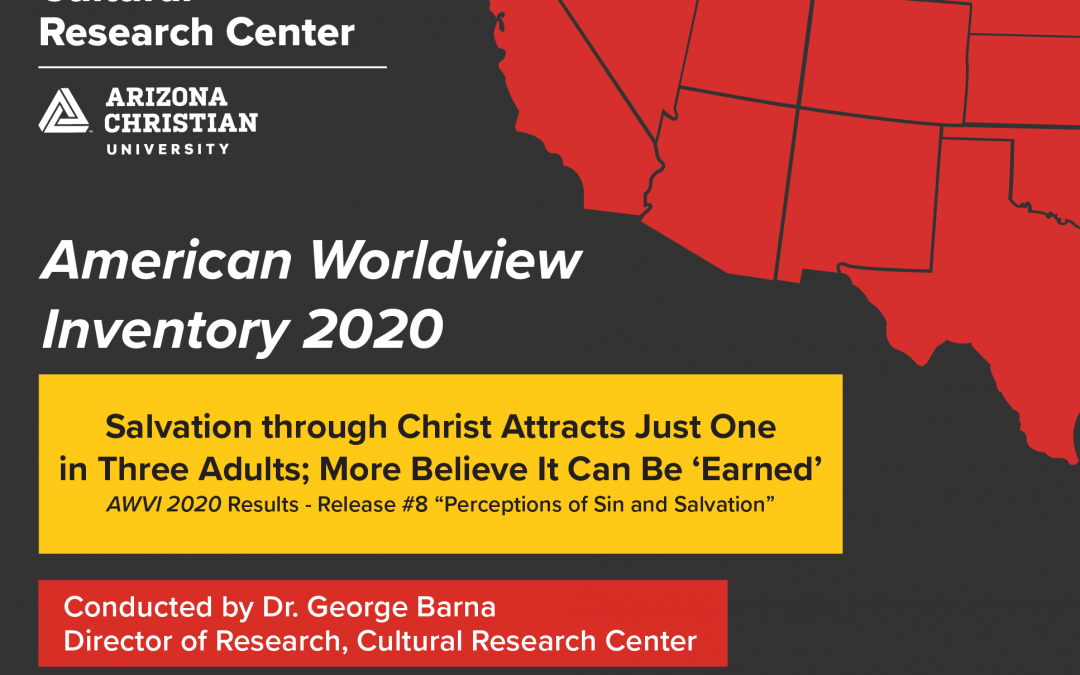By Dr. Tracy Munsil, Executive Director | Cultural Research Center at Arizona Christian University
Unlike past generations of Americans, who readily recognized the reality of sin and the need for salvation through Jesus Christ, U.S. adults today adopt a “salvation-can-be-earned” perspective, with a near-majority (48%) believing that if a person is generally good, or does enough good things during their life, they will “earn” a place in Heaven.
Only one-third of American adults (35%) continue to embrace the traditional biblical view that salvation comes through the sacrifice of Jesus Christ, according to findings from the American Worldview Inventory 2020 from the Cultural Research Center at Arizona Christian University.
“This lack of understanding of basic Christian theology is stunning, with potentially devastating consequences for individual souls and really for all aspects of American life and culture,” according to ACU President Len Munsil.
“It’s a wakeup call for the church, and for leaders in all areas of influence, to speak, teach, and work to restore biblical truth,” Munsil said. “Many souls will be lost if people are misled by the false notion that we can earn our way to heaven, rather than recognizing the truth that Christ alone and His righteousness are the basis for our salvation.”
The most recent findings of the AWVI 2020, conducted by CRC Director of Research Dr. George Barna, also show that these views of sin and salvation have permeated American culture so deeply that even a majority of people who describe themselves as Christian (52%) accept a “works-oriented” means to God’s acceptance.
What is even more shocking is that huge proportions of people who attend churches whose official doctrine says eternal salvation comes only from embracing Jesus Christ as savior nonetheless believe that a person can qualify for Heaven by being or doing good. That includes close to half of all adults associated with Pentecostal (46%), mainline Protestant (44%), and evangelical (41%) churches. A much larger share of Catholics (70%) embrace that point of view.
In addition, the relevance of sin is on the wane, with only slightly more than half of U.S. adults (56%) saying they consciously and consistently attempt to avoid sinning because they know it offends God.
According to Dr. Barna, these findings are consistent with earlier AWVI 2020 releases. “If you step back and look at the big picture painted by all of the outcomes in this research project it seems to suggest that people are in an ‘anything goes’ mindset when it comes to faith, morals, values, and lifestyle.”
Barna continued, “By abandoning our moral standards and traditions, and replacing them with inclusive and conditional preferences, we are losing the foundations that have enabled the ‘American experiment’ to succeed for more than two centuries.”
“We can only hope that our critical moral institutions – particularly the family and churches – will wake up and help the nation to get back on track,” Barna said.
Other key findings from the latest AWVI 2020 release include:
-
- Fewer Americans (49%) believe they have a personal responsibility, in appropriate situations, to share their religious beliefs with people who possess different religious beliefs. That is down slightly since 1991, when 53% of adults felt they had such an obligation, according to the findings.
- Only half of Americans (54%) believe they will experience Heaven after they die; 15% said they don’t know what will happen after they die; 13% said there is no life after death; 8% expect to be reincarnated; another 8% believe they will go to a place of purification prior to entering Heaven. Just 2% believe they will go to Hell.
- Born-again Christians, defined as people who not only claim to be Christian but also believe that when they die they will go to Heaven only because they have confessed their sins and have accepted Jesus Christ as their savior, were least likely to hold the “salvation-can-be-earned” view.
- Conservatives are much more likely (75%) to “consciously and consistently attempt to avoid sinning because they know it offends God,” compared to liberals (41%) or moderates (49%).
The full AWVI 2020 Release #8: “Perceptions of Sin and Salvation,” as well as previous releases, can be found here.

